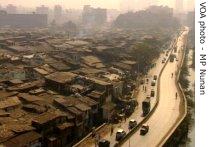-
(单词翻译:双击或拖选)
Geneva
27 June 2007
The United Nations warns that a doubling of urban populations in Africa and Asia by 2030 will have harmful consequences if governments do not prepare now for the coming growth. In this year's State of World Population report, the U.N. Population Fund says this unprecedented1 wave of urbanization offers potential opportunities or dismal2 failures. Lisa Schlein has more for VOA from Geneva.
 |
| Slums spring up anywhere there is a spare bit of land |
Chief of the U.N. Population Fund's Resource Mobilization Branch, Jean-Noel Wetterwald, says the urban explosion can be managed if governments prepare for it. But if they put their heads in the sand, he says, the future prospects4 will be frightening.
"Urbanization is unavoidable," he said. "You cannot stop it. So, it is better to prepare for it and, rather than concentrating on measures to avoid or to exclude people from cities, make sure that they have access to services such as health and schools. And this is what we are saying. The concentration of people concentrate the problems, but also concentrate solutions."
The report says the speed and scale of urban growth will require a revolution in thinking. It notes the number of people living in cities in Africa and Asia is increasing by about 1 million every week. It warns global action must be taken now to help cities prepare for growth and head off economic and social problems before it is too late.
The report says more than half of the world's current population of 6.7 billion people will be concentrated in cities by next year. While mega-cities of 10 million or more will continue to grow, it says most people will live in mid-size cities of 500,000 people or less.
The U.N. fund says most urban growth results from natural increase, that is people being born in the cities, rather than from migration5. It says policy makers6 can reduce the pace of growth by supporting measures such as poverty reduction initiatives, education, particularly of women and girls, and health measures, including reproductive health and family planning services.
Wetterwald tells VOA most of the people living in developing cities are poor and half of their populations are under age 25. He says these young people have special needs.
"We have to make sure that we have proper education services in place because if this is not the case, then you will see what urbanization can offer at its worst, which is criminality, illiteracy7 and all these evils," he added.
The report says cities are great places and should not be viewed negatively. For example, people can more easily access basic services there than in rural areas. While cities may have poverty, they also offer an escape from poverty. It notes no country in the industrial age has ever achieved significant economic growth without urbanization.
 收听单词发音
收听单词发音
1
unprecedented

|
|
| adj.无前例的,新奇的 | |
参考例句: |
|
|
|
2
dismal

|
|
| adj.阴沉的,凄凉的,令人忧郁的,差劲的 | |
参考例句: |
|
|
|
3
dwellers

|
|
| n.居民,居住者( dweller的名词复数 ) | |
参考例句: |
|
|
|
4
prospects

|
|
| n.希望,前途(恒为复数) | |
参考例句: |
|
|
|
5
migration

|
|
| n.迁移,移居,(鸟类等的)迁徙 | |
参考例句: |
|
|
|
6
makers

|
|
| n.制造者,制造商(maker的复数形式) | |
参考例句: |
|
|
|
7
illiteracy

|
|
| n.文盲 | |
参考例句: |
|
|
|















